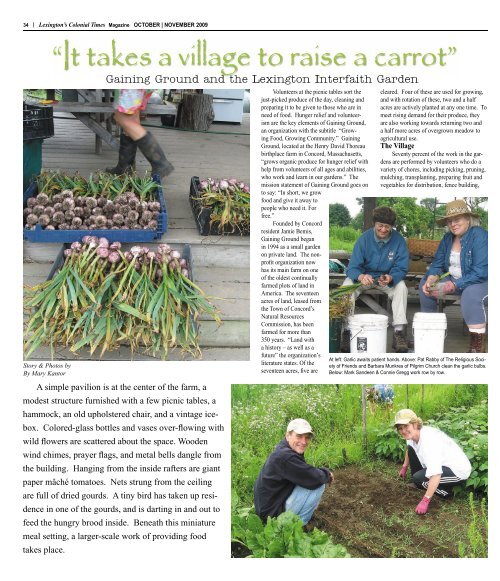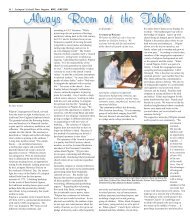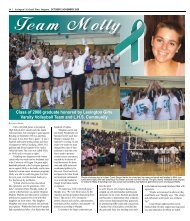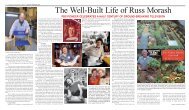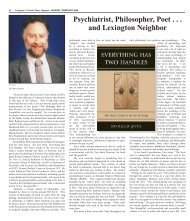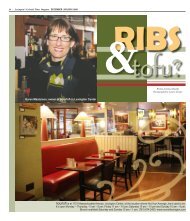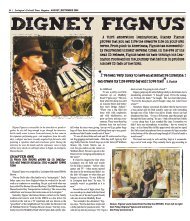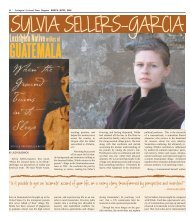Lexington Interfaith Garden - Colonial Times Magazine
Lexington Interfaith Garden - Colonial Times Magazine
Lexington Interfaith Garden - Colonial Times Magazine
You also want an ePaper? Increase the reach of your titles
YUMPU automatically turns print PDFs into web optimized ePapers that Google loves.
34 | <strong>Lexington</strong>’s <strong>Colonial</strong> <strong>Times</strong> <strong>Magazine</strong> OCTOBER | NOVEMBER 2009<br />
Story & Photos by<br />
By Mary Kantor<br />
“It takes a village to raise a carrot”<br />
Gaining Ground and the <strong>Lexington</strong> <strong>Interfaith</strong> <strong>Garden</strong><br />
A simple pavilion is at the center of the farm, a<br />
modest structure furnished with a few picnic tables, a<br />
hammock, an old upholstered chair, and a vintage icebox.<br />
Colored-glass bottles and vases over-flowing with<br />
wild flowers are scattered about the space. Wooden<br />
wind chimes, prayer flags, and metal bells dangle from<br />
the building. Hanging from the inside rafters are giant<br />
paper mâché tomatoes. Nets strung from the ceiling<br />
are full of dried gourds. A tiny bird has taken up residence<br />
in one of the gourds, and is darting in and out to<br />
feed the hungry brood inside. Beneath this miniature<br />
meal setting, a larger-scale work of providing food<br />
takes place.<br />
Volunteers at the picnic tables sort the<br />
just-picked produce of the day, cleaning and<br />
preparing it to be given to those who are in<br />
need of food. Hunger relief and volunteerism<br />
are the key elements of Gaining Ground,<br />
an organization with the subtitle “Growing<br />
Food, Growing Community.” Gaining<br />
Ground, located at the Henry David Thoreau<br />
birthplace farm in Concord, Massachusetts,<br />
“grows organic produce for hunger relief with<br />
help from volunteers of all ages and abilities,<br />
who work and learn in our gardens.” The<br />
mission statement of Gaining Ground goes on<br />
to say: “In short, we grow<br />
food and give it away to<br />
people who need it. For<br />
free.”<br />
Founded by Concord<br />
resident Jamie Bemis,<br />
Gaining Ground began<br />
in 1994 as a small garden<br />
on private land. The nonprofit<br />
organization now<br />
has its main farm on one<br />
of the oldest continually<br />
farmed plots of land in<br />
America. The seventeen<br />
acres of land, leased from<br />
the Town of Concord’s<br />
Natural Resources<br />
Commission, has been<br />
farmed for more than<br />
350 years. “Land with<br />
a history – as well as a<br />
future” the organization’s<br />
literature states. Of the<br />
seventeen acres, five are<br />
cleared. Four of these are used for growing,<br />
and with rotation of these, two and a half<br />
acres are actively planted at any one time. To<br />
meet rising demand for their produce, they<br />
are also working towards returning two and<br />
a half more acres of overgrown meadow to<br />
agricultural use.<br />
The Village<br />
Seventy percent of the work in the gardens<br />
are performed by volunteers who do a<br />
variety of chores, including picking, pruning,<br />
mulching, transplanting, preparing fruit and<br />
vegetables for distribution, fence building,<br />
At left: Garlic awaits patient hands. Above: Pat Rabby of The Religious Society<br />
of Friends and Barbara Munkres of Pilgrim Church clean the garlic bulbs.<br />
Below: Mark Sandeen & Connie Gregg work row by row.
weeding, weeding, and more weeding. Under<br />
the leadership and able hands of Gaining<br />
Ground farmer Verena Wieloch and her staff,<br />
the skills and needs of people are matched<br />
with the work that needs to be done on a<br />
specific day. In 2008 more than 2000 volunteers<br />
of all ages, abilities, and backgrounds<br />
contributed over 6300 volunteer hours. And<br />
almost everyone who volunteers at Gaining<br />
Ground comes back.<br />
Gaining Ground does not just provide<br />
food for the hungry, but it also teaches<br />
people about organic gardening, the basics<br />
of agriculture, how food is grown, cultivated<br />
and distributed. According to Emily Wheeler,<br />
the administrative coordinator, “We serve<br />
the community in two ways. We help feed<br />
the hungry, and we also provide a way for<br />
volunteers to become part of the process.<br />
People from the suburbs and the city alike<br />
love learning about gardening.” This learning<br />
is done by doing and it’s done outside. “How<br />
fun is that?” the organization’s materials ask.<br />
“We see real opportunities in experiential<br />
learning on the farm. Some of us call this the<br />
joy and wonder of the garden… We rely on<br />
the spontaneity of experience. For example,<br />
if it’s buggy outside, volunteers learn about<br />
bugs. If it hasn’t rained in weeks, they learn<br />
about irrigation. If a flock of turkeys wanders<br />
Gorgeous beets with bright red spines yield treasure above and below ground. Beets are full of folate, manganese<br />
and potassium. The greens are loaded with beta-carotene, vitamin C, iron and calcium.<br />
A small shelter provides a gathering place for all of the volunteers at the Gaining Ground farm.<br />
through the fields, they learn a little bit about<br />
turkeys. And our staff is right there with<br />
them, learning as well.” And while teaching<br />
and learning may be involved, Gaining<br />
Ground’s website states: “In the end our<br />
volunteers, Board, staff, and supporters have<br />
to find their work with Gaining Ground<br />
rewarding and fun.” In the materials of their<br />
thirty-page model and mission, a whole<br />
page is devoted to fun, with one item on the<br />
list playfully announcing: “We have a fully<br />
operational funnelator at the garden that<br />
OCTOBER | NOVEMBER 2009 <strong>Lexington</strong>’s <strong>Colonial</strong> <strong>Times</strong> <strong>Magazine</strong> | 35<br />
shoots rotten tomatoes alarming distances.”<br />
“ My dad was a gardener and grew a lot of<br />
what we ate,” says farmer Weiloch about her<br />
early influences. “I think I had a little bit of it<br />
plunked in my mind and that’s what’s important<br />
about the kids who come out here. Even<br />
if they think, ‘I don’t like this,’ just a little<br />
taste of it literally plants that mental seed.<br />
They’re going to remember and say, ‘That<br />
was really fun.’”<br />
The Carrot<br />
Gaining Ground crops are transported no<br />
more than twenty minutes from the farm; this<br />
food is distributed no more than twenty-four<br />
hours after it is harvested. As noted in their<br />
mission, this local, and sustainable approach<br />
to farming is kept on a small scale, “enabling<br />
a closer connection with the land,” with<br />
growth “in a careful, considered fashion.”<br />
Regarding this thoughtful tending of the land,<br />
Wieloch recalls her grandmother: “She used<br />
to say that farms are like teeth. If you don’t<br />
take care of them, you’ll miss ‘em when<br />
they’re gone.”<br />
Each growing season approximately<br />
20,000 pounds of organic produce is raised.<br />
The recipients are individuals and families,<br />
with over forty households served this<br />
growing season. This food is also served and<br />
distributed at about a dozen meal programs,<br />
food pantries, and shelters in the area, including<br />
The Open Table (Concord), Food for<br />
Free (Cambridge), Ayer Council for Aging,<br />
Sylvia’s Haven (Devens), Sudbury Food<br />
Volunteers weeding the carrots under the supervision of Michelle from Gaining Ground.<br />
Pantry, Concord-Assabet School, Loaves and<br />
Fishes (Ayer), Project Soup (Somerville),<br />
Walnut Street Center (Somerville), and<br />
Cameron Senior Center (Westford). Gaining<br />
Ground also maintains a waiting list of<br />
organizations in need. “By introducing highvalue,<br />
healthy, fresh organic produce into the<br />
hunger-relief system, we reach people who<br />
may not get anything like it. And who really<br />
appreciate it. We’ve seen food recipients get<br />
all misty-eyed at the sight of all the produce<br />
we give away–because they can’t believe it’s<br />
true. But it is. And by donating this produce,<br />
we help do more than keep people fed. We<br />
help inspire hope.”<br />
<strong>Lexington</strong> <strong>Interfaith</strong> <strong>Garden</strong><br />
According to the Gaining Ground organization:<br />
“We’re excited about the potential<br />
our model holds in communities beyond Concord.<br />
We don’t want to become a huge organization<br />
or open Gaining Ground ‘franchises.’<br />
We simply want to inspire people to do something<br />
similar in their own communities.” And<br />
the Gaining Ground model inspired a summer<br />
field trip from <strong>Lexington</strong> by members of the<br />
<strong>Lexington</strong> InterFaith Environmental Action<br />
Team (LIFE Action Team). According to the<br />
local leader, Mark Sandeen: “We’ve been asking<br />
ourselves the question: How can we live<br />
our faith in a way that’s best for the Earth as<br />
well as our community? The more we looked<br />
into the issues of environmental stewardship,<br />
the more we realized what a big impact our<br />
food choices have on the environment and on<br />
our neighbors, whether they be local, regional<br />
or global neighbors.” LIFE Action Team<br />
has people participating from a wide range<br />
of faith communities in <strong>Lexington</strong> and the<br />
surrounding area. Many of the members volunteered<br />
at Gaining Ground over the summer<br />
to learn how to run an organic farm/garden.<br />
“One of our first steps toward establishing our<br />
own interfaith garden is to learn from others<br />
in the area who have been successful…Our<br />
main objective is to see an organic farm in<br />
action, to learn everything we can and to<br />
experience the beauty<br />
of God’s gift of growing<br />
our food,” said<br />
Sandeen on one of<br />
these summer visits.<br />
Momentum is<br />
building towards this<br />
interfaith garden, as<br />
Sandeen notes: “the<br />
seeds of the idea have<br />
been planted, and<br />
we are watering and<br />
fertilizing right now.”<br />
After a September<br />
planning meeting,<br />
Rev. Dana Allen<br />
Walsh of Hancock<br />
Church stated: “There<br />
is a lot of excitement<br />
and energy in town<br />
for an organic, sustainable<br />
interfaith garden. I think issues of food<br />
insecurity, hunger, and sustainability have<br />
touched a nerve with many people in town.”<br />
According to Barbara Munkres of Pilgrim<br />
Church, “It is an idea whose time has come.”<br />
A location for a garden has not yet been<br />
chosen but there are three strong possibilities<br />
with each currently being evaluated. “We are<br />
not ready to announce the location yet. We<br />
<strong>Lexington</strong> <strong>Interfaith</strong> <strong>Garden</strong>, continued on page 51
<strong>Interfaith</strong> <strong>Garden</strong>, continued from page 35<br />
is a lot of excitement and energy in<br />
town for an organic, sustainable interfaith<br />
garden. I think issues of food insecurity,<br />
hunger, and sustainability have touched a<br />
nerve with many people in town.” According<br />
to Barbara Munkres of Pilgrim Church, “It<br />
is an idea whose time has come.” A location<br />
for a garden has not yet been chosen but<br />
there are three strong possibilities with each<br />
currently being evaluated. “We are not ready<br />
to announce the location yet. We are hoping<br />
to announce it at the <strong>Interfaith</strong> Thanksgiving<br />
Service on Tuesday, November 24 th at Temple<br />
Emunah,” said Rev. Walsh.<br />
The Mission<br />
A plot is not yet in place for the groundbreaking<br />
and tilling of this garden, and a website<br />
is still under construction, but the mission<br />
statement articulated on the site is complete.<br />
The <strong>Lexington</strong> <strong>Interfaith</strong> <strong>Garden</strong> builds<br />
meaningful interfaith relationships by<br />
working together to grow organic produce<br />
for our hungry neighbors.<br />
Our Hope is:<br />
• To provide fresh produce for people in<br />
need.<br />
• To educate ourselves and our community<br />
on the value of local, sustainable<br />
farming.<br />
• To build connections within our interfaith<br />
communities.<br />
• To have fun while doing rewarding<br />
work.<br />
• To foster the notion of community and<br />
community work.<br />
At this stage, ten faith communities<br />
are actively involved in the planning for<br />
the <strong>Interfaith</strong> <strong>Garden</strong>: First Parish U.U.,<br />
Temple Emunah, Islamic Center of Boston<br />
in Wayland, Hancock Church, Temple<br />
Isaiah, Pilgrim UCC, The Religious Society<br />
of Friends, Follen Society, Church of Our<br />
Redeemer, and Grace Chapel. One hundred<br />
percent of the harvest of an interfaith garden<br />
will go to feeding the hungry; the <strong>Lexington</strong><br />
<strong>Interfaith</strong> Pantry will be one of the ways<br />
this produce is distributed.<br />
Rev. Walsh notes: “We are hoping to get<br />
a $100 contribution from each faith community<br />
for the garden. We plan on starting small<br />
and using the first year as a ‘pilot’ to see<br />
what works and what doesn’t. To accomplish<br />
our long-term goal of having a permanent,<br />
sustainable garden in <strong>Lexington</strong>, we will be<br />
working with LexFarm to advocate and support<br />
their mission.” (LexFarm is the <strong>Lexington</strong><br />
Community Farm Coalition, whose goal<br />
is to bring community farming to <strong>Lexington</strong>.)<br />
The home page of the interfaith garden’s<br />
developing website announces:<br />
Communities of faith can play a substantial<br />
role by demonstrating a commitment<br />
to supporting a sustainable food system by<br />
creating interfaith gardens that grow food for<br />
any one who may need it.<br />
Food is a profoundly spiritual and ethical<br />
concern. In today’s interconnected world we<br />
further acknowledge the interconnectedness<br />
on the planet by growing and sharing food.<br />
Acknowledging this interconnectedness<br />
and need for sharing of food, Pat Rabby, of<br />
the Religious Society of Friends, recalling<br />
Fred Small’s lyrics about being “temporarily<br />
able-bodied,” noted that “we are temporarily<br />
well-fed…”<br />
“Interconnectedness by growing and<br />
sharing food”: basic elements of the vision<br />
and work of Gaining Ground and a goal of<br />
the <strong>Lexington</strong> <strong>Interfaith</strong> <strong>Garden</strong>. Perhaps a<br />
vision captured succinctly in a statement on<br />
the Gaining Ground website: “It takes a village<br />
to raise a carrot.”<br />
FIND OUT MORE:<br />
• www.gainingground.org<br />
• www.interfaithgarden.org<br />
• www.lexfarm.org<br />
OCTOBER | NOVEMBER 2009 <strong>Lexington</strong>’s <strong>Colonial</strong> <strong>Times</strong> <strong>Magazine</strong> | 51


